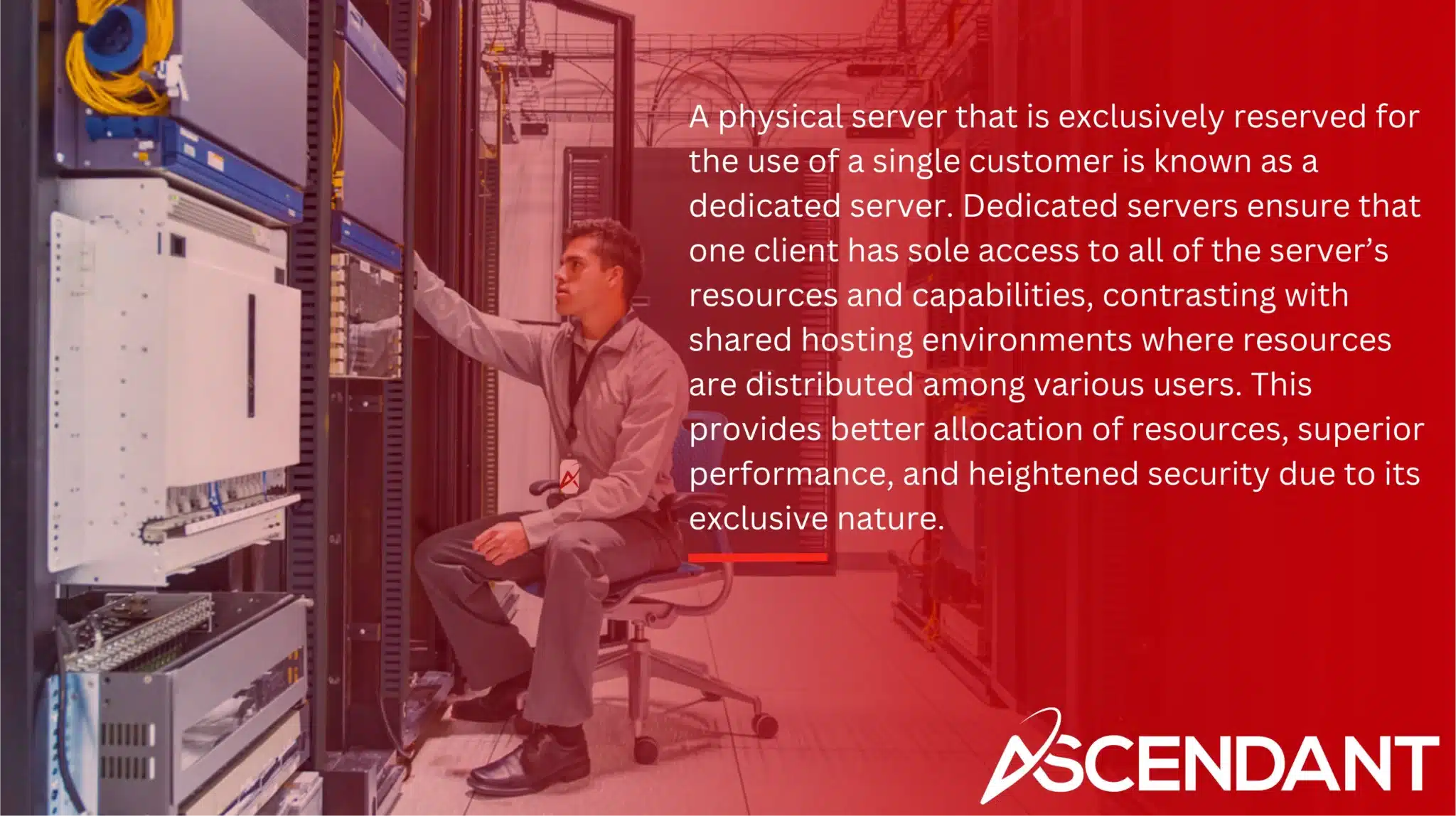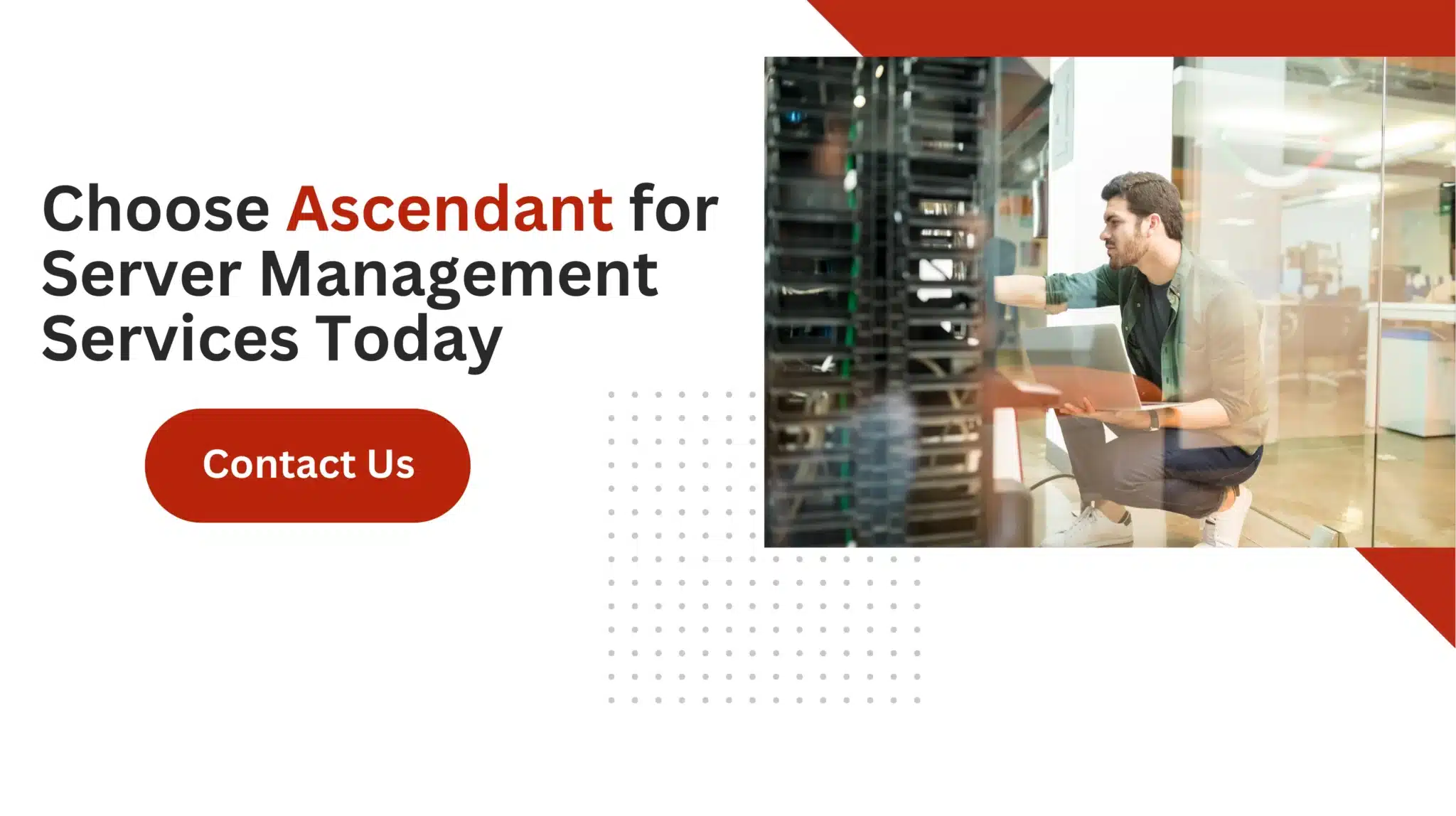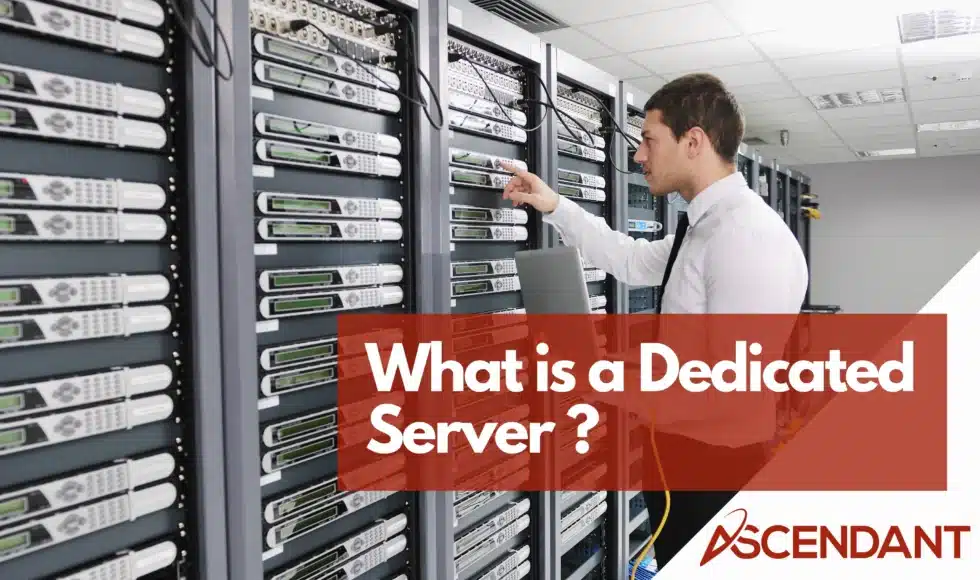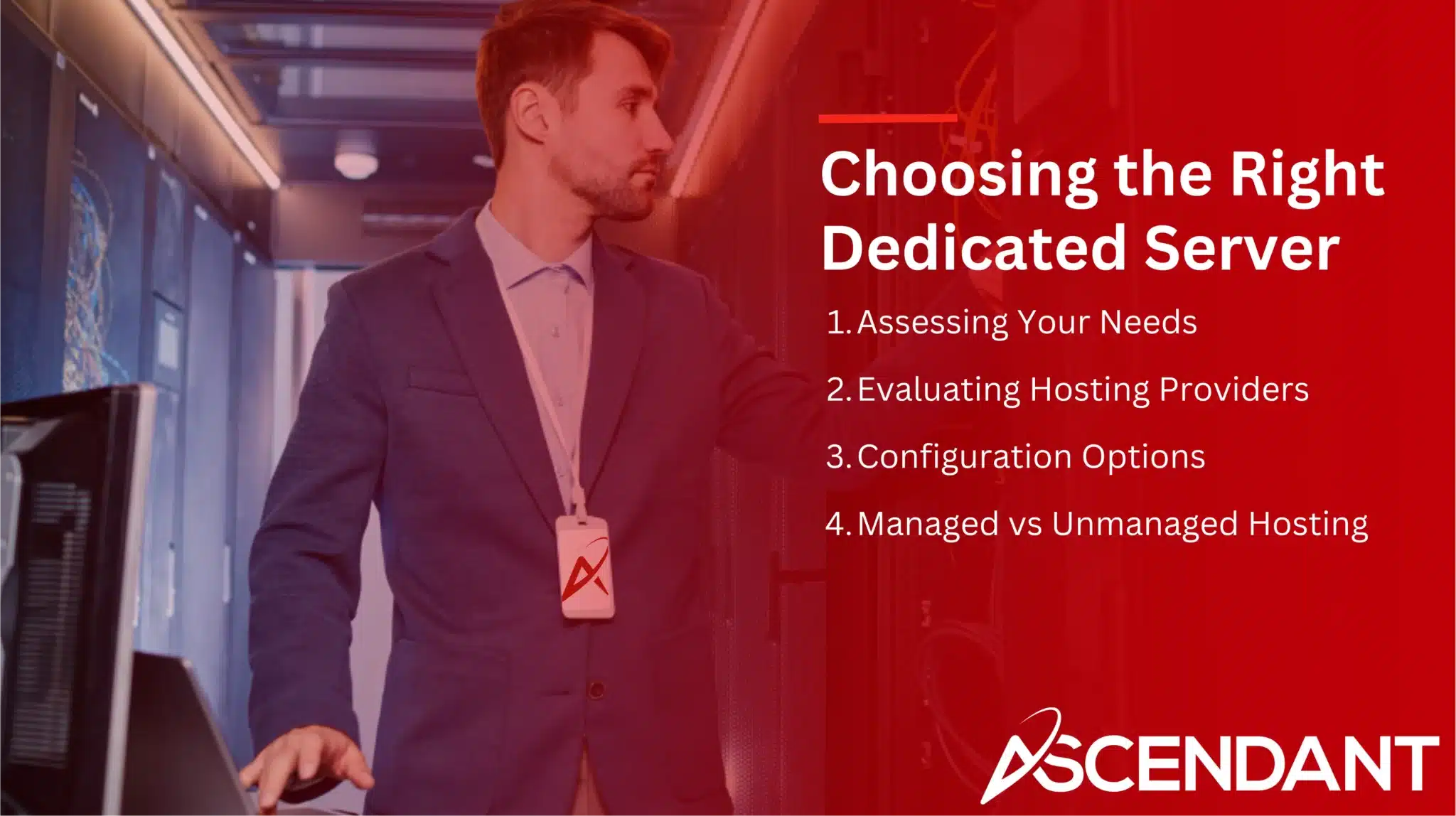A dedicated server is a physical server reserved for a single customer. Unlike shared hosting, it provides exclusive access to all resources. In this article, you will learn how dedicated servers work, their benefits, and how to choose the right one for your needs.
Key Takeaways
- Dedicated servers provide exclusive access to resources, ensuring high performance, security, and customization for individual clients.
- They offer significant benefits over shared hosting and VPS, including better resource allocation, enhanced security, and complete control over server configurations.
- When choosing a dedicated server, consider your specific needs, evaluate hosting providers, and understand configuration options to ensure the best fit for your business.
Understanding Dedicated Servers
Dedicated hosting is underpinned by the robustness of dedicated servers, ensuring secure and dependable high-performance hosting solutions. These types of servers distinguish themselves in the realm of hosting options due to their provision of exclusive access to server hardware resources, which facilitates unparalleled control and personalization over your own dedicated server.
Achieving a comprehensive understanding of dedicated servers is key to leveraging their complete capabilities.
Definition of a Dedicated Server

A physical server that is exclusively reserved for the use of a single customer is known as a dedicated server. Dedicated servers ensure that one client has sole access to all of the server’s resources and capabilities, contrasting with shared hosting environments where resources are distributed among various users. This provides better allocation of resources, superior performance, and heightened security due to its exclusive nature.
Dedicated servers enable comprehensive customization when it comes to server configurations and software setups. This level of control makes them particularly suited for businesses requiring tailored hosting solutions according to their unique demands.
How Dedicated Servers Work
Dedicated servers are tied to powerful network frameworks that supply the necessary electricity, bandwidth, and security protocols crucial for uninterrupted service. They ensure allocated bandwidth, which significantly improves webpage load speeds and overall site reactivity—a key aspect for sites managing vast volumes of requests.
These servers grant users complete autonomy in tailoring software setups, user account configurations, and services. This degree of customization is unattainable with shared hosting solutions where resources are distributed among multiple clients.
Dedicated Server vs Shared Hosting
Hosting on shared servers is a widely-used hosting solution suitable for small websites and applications, where the server resources are distributed among various users. This arrangement can cause complications such as resource leakage, delayed responses, and reduced performance levels, which are particularly problematic in high-traffic scenarios like online gaming.
Conversely, dedicated servers provide an exclusive allocation of resources to a single client. This approach delivers enhanced performance stability and reliability while offering greater autonomy with respect to server configurations.
Dedicated Server vs VPS
Dedicated servers, in contrast to Virtual Private Servers (VPS) that distribute the resources of a physical server among several users, assign all server resources exclusively to one customer. This grants increased performance and control as users gain full access to the hardware resources, enabling more accurate configurations and enhanced performance when compared with VPS setups.
Benefits of Using a Dedicated Server
Dedicated servers offer a wealth of advantages, including high performance and dependability, as well as improved security and total customization options. These features are tailored to cater to the stringent requirements of contemporary enterprises, ensuring that your online activities are significantly boosted.
High Performance and Reliability
By providing exclusive access to all resources, dedicated servers offer markedly better performance and stability for a single user. This exclusivity boosts speed and mitigates performance problems during periods of intense traffic, ensuring steady uptime and dependability, even when traffic levels are high.
Enhanced Security Features
With dedicated servers, the isolation from neighboring users greatly diminishes the likelihood of security breaches. This separation protects user data and lessens vulnerability to threats, while also permitting a wide range of customization for security protocols.
Complete Control and Customization
In a virtual server environment, users can achieve exceptional customization and control with dedicated servers. This empowers them to tailor the operating system, install personalized applications, and adjust configurations in alignment with their business demands.
Scalability and Flexibility
Dedicated servers offer the adaptability required for scaling resources to accommodate growing bandwidth and traffic needs, ensuring efficient management of assets as your business expands. This capability is pivotal in supporting strategies aimed at sustained growth.
Common Uses of Dedicated Servers
Dedicated servers offer adaptability and can be customized for a wide range of uses. Whether it’s for web hosting, gaming platforms, e-commerce sites, or development settings, dedicated servers deliver the necessary performance and dependability to meet various commercial requirements.
Web Hosting and Content Management Systems
Dedicated servers are optimal for hosting websites that utilize content management systems, such as WordPress. They offer improved performance and greater control, guaranteeing a dependable and secure hosting solution for a range of industries.
Gaming Servers
Dedicated game servers provide an enhanced gameplay experience by delivering outstanding performance and reliability for online gaming. These gaming servers grant players full control over their gaming environment, leading to decreased latency and elevated quality of the game.
E-Commerce Platforms
E-commerce platforms flourish by utilizing dedicated servers, which grant unrestricted access to CPU and disk resources. Such access is essential for handling heavy traffic volumes and maintaining seamless functioning.
Development and Testing Environments
In software development, dedicated servers offer enhanced command over testing landscapes, allowing for the handling of various builds and promoting productive testing as well as development processes.
Choosing the Right Dedicated Server
When choosing the appropriate dedicated server, it is crucial to thoroughly assess your particular requirements, scrutinize hosting providers, and comprehend the various setup choices available.
The following segment offers a walkthrough to aid you in making a knowledgeable choice regarding your hosting needs.
Assessing Your Needs
Evaluating your hosting requirements includes considering aspects like the volume of traffic, necessary resources, and financial limitations. For example, if you expect more than 500k visitors per month for WordPress hosting, opting for a dedicated server is advisable.
Evaluating Hosting Providers
When selecting a hosting provider, consider uptime guarantees, customer support availability, and performance monitoring tools. Comparing different providers helps find the best value for your needs.
Configuration Options
Dedicated server configurations can range from basic setups suitable for simple applications to more complex ones designed for heavy workloads. Key factors to consider are the computing power (CPU), memory (RAM), and storage capacity of the disk.
Managed vs Unmanaged Hosting
Managed hosting services offer extensive assistance with management and maintenance, while unmanaged hosting allows complete control over configurations but requires technical know-how for proper management.
Setting Up and Maintaining Your Dedicated Server
Establishing and managing a dedicated server requires essential actions that include the initial configuration as well as continuous security measures and performance tracking.
Initial Setup
Initiating the installation of a dedicated server necessitates employing tools from the operating system to download and install software packages, which demands root access for configuring settings and guaranteeing correct installation.
Security Best Practices
To protect a dedicated server, it is essential to establish strong firewalls and take steps for intrusion prevention. It’s crucial to consistently apply updates and patches to secure the server from vulnerabilities and prevent unauthorized entry.
Monitoring and Maintenance
Monitoring performance and resource usage of the server helps identify potential issues before they impact functionality. Routine performance checks and regular software updates are essential for maintaining optimal server operations.
Cost Considerations
Understanding the financial aspects of dedicated servers is crucial for proper budgeting. This segment will explore various pricing structures, extra expenses, and advice on how to manage your budget effectively.
Pricing Models
Transparent pricing structures help avoid hidden fees. Understanding common pricing models aids in making informed decisions when choosing dedicated server hosting.
Additional Costs
Security features, software licenses, and hardware upgrades can incur extra expenses for dedicated server hosting. Ensuring consistent backups is vital to safeguard data from potential loss due to crashes or cyber threats in the realm of server hosting.
Budgeting Tips
To budget effectively, it’s essential to comprehend the expenses related to dedicated servers while also preparing for unforeseen costs. Employing cost-saving tactics could include opting for an appropriate pricing scheme and regularly evaluating server requirements.
Summary
To sum up, dedicated servers provide unmatched security, control, and performance levels which are perfect for websites with heavy traffic, e-commerce platforms, and gaming servers. Grasping the advantages of dedicated servers as well as knowledge on selecting and managing the appropriate server ensures that your web-based activities will operate at peak efficiency and dependability.
 Frequently Asked Questions
Frequently Asked Questions
What is a dedicated server?
A physical server that is exclusively reserved for a single client, known as a dedicated server, guarantees not only the best allocation of resources but also superior performance and improved security.
For companies in search of reliable and powerful hosting options, this arrangement serves as an excellent choice.
How do dedicated servers work?
By offering exclusive access to resources and the ability to tailor software settings, dedicated servers deliver improved performance with strong network links and assured bandwidth.
Such an arrangement facilitates ideal management and effectiveness customized for individual requirements.
What are the benefits of using a dedicated server?
Using a dedicated server provides high performance, reliability, enhanced security, and full control, making it an excellent choice for high-traffic websites and resource-intensive applications.
Ultimately, it ensures that your business can scale effectively while maintaining optimal operation.
How do I choose the right dedicated server?
To choose the right dedicated server, assess your specific needs such as traffic and resource requirements, then compare hosting providers on uptime and support.
Also, determine if you prefer managed or unmanaged hosting options.
What are the cost considerations for dedicated servers?
The expenses associated with dedicated servers extend beyond the initial price tag, encompassing elements such as security features, software licenses, and upgrades to hardware components.
Comprehending these cost-driving aspects is crucial for proper budget planning and choosing a suitable pricing structure.


